Court Cases
-
Swarthout v. Cooke, 562 U.S. 2011
The Supreme Court of the United States held that there is no right under the Federal Constitution to be conditionally released prior to the expiration of a valid sentence. In the context of parole, the procedures required are minimal.
-
Greenholtz v. Inmates for Nebraska Penal and Correctional Complex. 1979
The Supreme Court of the United States held that an inmate received adequate process when he was allowed an opportunity to be heard and was provided a statement of the reasons why parole was denied. The Constitution does not require more.
-
Burnette v. Fahey, 687 F.3d. 171. 2012
The Fourth Circuit Court of Appeals affirmed the district court’s dismissal of inmate appellants’ complaint as the complaint failed to set forth sufficient facts to establish a plausible entitlement to relief under either a due process or ex post facto theory. Because the decision to grant parole is a discretionary one, a prisoner cannot claim entitlement and therefore a liberty interest in release. There is no protected liberty interest in the exercise of discretion.
-
Gagnon v. Scarpelli, 411 U.S. 778. 1973
The Supreme Court of the United States decided the right to counsel during probation or parole revocation hearings must be made on a case-by-case basis in the exercise of a sound discretion by the state authority charged with responsibility for administering the probation and parole system.
-
Morrissey v. Brewer, 408 U.S. 401. 1972
The Supreme Court of the United States outlines the due process requirements for revocation of parole.
-
Montgomery v. Louisiana, 577 U.S. 2016
After its previous ruling in Miller v. Alabama, wherein the United State Supreme Court held that a mandatory life sentence without parole should not apply to juveniles convicted of murder; the Court ruled to retroactively apply the decision.
Victim Services — External Resources
-
Virginia Department of Criminal Justice Services
Victims can find the Crime Victims’ Bill of Rights, which contains information about protection, financial assistance, notice of court dates and post-trial notices, and victim input in the parole process. Victims can also use the Victim Assistance Directory to find local victim and witness programs, and they can find the contact information for the DCJS Info-Line.
-
Virginia Sexual and Domestic Violence Action Alliance
This website provides a directory of the Sexual & Domestic Violence Agencies in Virginia and the contact information for the Virginia Family Violence & Sexual Assault Hotline.
-
Virginia State Police Sex Offender Registry
This provides visitors access the sex offender registry, information about wanted sex offenders, and a list of sexual offense statutes.
-
The Criminal Injuries Compensation Fund (CICF)
Visitors can find the Criminal Injuries Compensation Fund claim application and other forms, search a list of eligibility benefits for crime victims, and find out more information about restitution and repayment.
-
Office of the Attorney General Victim-Notification Program
This website provides victims with information about the Victim Notification Program, the appeals process in Virginia, and Habeas Corpus. It also provides the Victim Information Sheet and the contact information for the Office of the Attorney General Victim Notification.
-
National Organization for Victim Assistance (NOVA)
Victims can find links to the Office for Victims of Crime, the Homeland Security Investigations Victim Notification Program, the FBI, the Department of Justice, and information for crime victims’ rights.
-
U.S. Department of Justice Office of Victims of Crime
This website provides a list of helplines of national organizations that provide services to crime victims and a resource map of compensation programs.
Parole — External Resources
-
211 Virginia database
This website is a directory of community service organizations in Virginia. Visitors can search for organizations by “need” or by “program.”
-
Virginia Criminal Sentencing Commission
The Virginia Criminal Sentencing Commission is responsible for developing, implementing, and administering felony sentencing guidelines. Their website has meeting minutes and annual reports about their discussions on these guidelines.
-
Virginia Department of Corrections
Visitors can find information about Virginia’s correctional facilities including the security level, program information, and contact information for each facility.
-
Secretary of the Commonwealth
Visitors can visit the Judicial System page to learn more about Virginia’s policies about extradition, pardons, and restoration of rights. Visitors can also visit the Forms page to download the 5 Year Applicant petition for restoration of rights or fill the application out and submit it online.
-
Governor of Virginia
The Governor’s website has news and executive orders from the Governor of Virginia, contact information for the governor, and information about the Virginia Secretary of Public Safety.
-
Virginia Law
This website provides links to the Code of Virginia, the Virginia Administrative Code, and the Constitution of Virginia.
